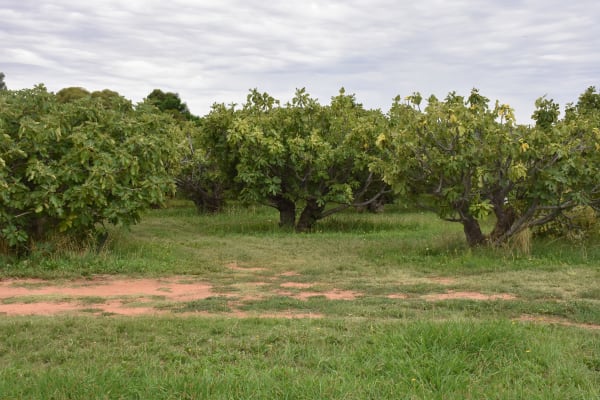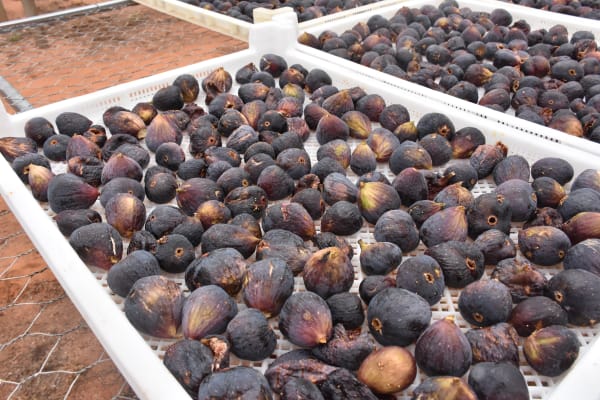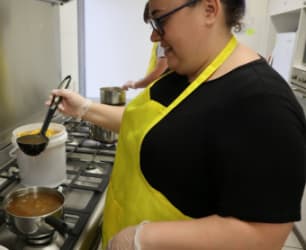ONE-hundred-and-three years ago, Sue Heward’s grandfather returned from WWI to Monash as a soldier-settler, planting shiraz grapes on the block.
Fast forward to 2024, the vines are now gone but in return flourishing fig and quince orchards have been created by Sue and her family, providing Sue with some of the key ingredients for her business: Singing Magpie.
Singing Magpie started out in 2017, after Sue returned to Monash after venturing around Australia and internationally.
The plan started with semi-dried figs and quinces, which has now expanded to sticky quince syrup and figs, other local sun-dried produce, fruit enrobed in premium dark chocolate couverture and local giftboxes.
With two types of figs on the block, white Smyrna figs, which were planted over 80 years ago, and black Genoa figs, with harvesting of the figs beginning in late January for Sue’s family and their team, and will usually run until the start of April.
Sue said one of the keys to a good white Smyrna fig is seeing if they have cracks in the skin or not.
“Usually when you pick a good fig, you look for cracks and when you are in the shops, you don’t get them like this,” she said.
“The black Genoa figs are usually the first ones to crop and then maybe a couple of weeks later the white Smyrna figs will crop.

“How big the harvest is depends on the year, so this year we are looking at about 30 tonnes of figs, which will mostly be the white Smyrnas.
“If you’ve never had a fig straight off the tree, you’ve never had a fig.”
Sue’s parents, who are in their seventies, continue to grow the figs on the families block, with Sue purchasing the figs off her parents and drying them for her business.
Sue has a team of local women who help her with the drying out of the figs, which occurs just across the road from the block of trees on a series of drying racks.
“Obviously we work together,” she said.
“We will dry maybe about five tonnes of figs. They take about three to five days to dry.
“So what we do is we dry them, then we refrigerate them and once we actually sell them we wash and pasteurise them, which just prevents any mould.
“Lots of people ask us do the birds come and eat them?
“They aren’t really bothered because I think there’s just so much fruit grown around there is enough to go around; we have guards on the drying racks so the mice can’t get up and we have to put a bit of ant-rid to stop the ants but generally speaking our hot, dry weather is perfect for drying fruit.
“These drying racks are brilliant. So the girls just come along and we sort through them. From Singing Magpie’s point-of-view, we either sell them online through our website in giftboxes or wholesale direct to chefs.”
Due to the current Riverland fruit fly outbreak, the family don’t do any fresh figs, as figs also aren’t very robust making it hard to transport a good fresh fig.
“So probably two thirds of the figs go across the road where we have a packing shed and the girls cut them in half and weigh them and then they go off and get frozen and transferred out for cooking and then the other third I take for Singing Magpie.”
Along with the figs, there is also a quince orchard with approximately 50 trees.
“These quinces are magnificent. They won’t be ready until May, so they still have a bit of growing to do,” Sue said.
“Some of these quinces will be 800 grams; they will be massive and bright yellow, and very fragrant.
“We don’t spray any of our figs or quinces. We aren’t organic but we don’t do any spraying whatsoever.
“We are the only ones in Australia who sun-dry quince, because it’s quite arduous. They get picked to be made into quince paste mostly, so we send them to New South Wales to get cooked there and then they are sold to food manufactures like Maggie Beer and Beerenberg.”
When it comes to Singing Magpie, Sue has built a business that showcases not only what her family has to offer, but the Riverland as a whole.
“We do things like giftboxes, which are a real story of the Riverland,” Sue said.
“We buy peaches, pears, apricots, nectarines, plums and jujubes. We use Almondco almonds, we buy other people‘s citrus and its just a lovely story of the Riverland, there’s just so much to offer.
“There’s so much produce in the Riverland that it’s endless what you can do really. So Singing Magpie is kind of like the valuated side of our family orchard basically.
“It’s a wonderful opportunity really and you can just tell the story of the Riverland.”









